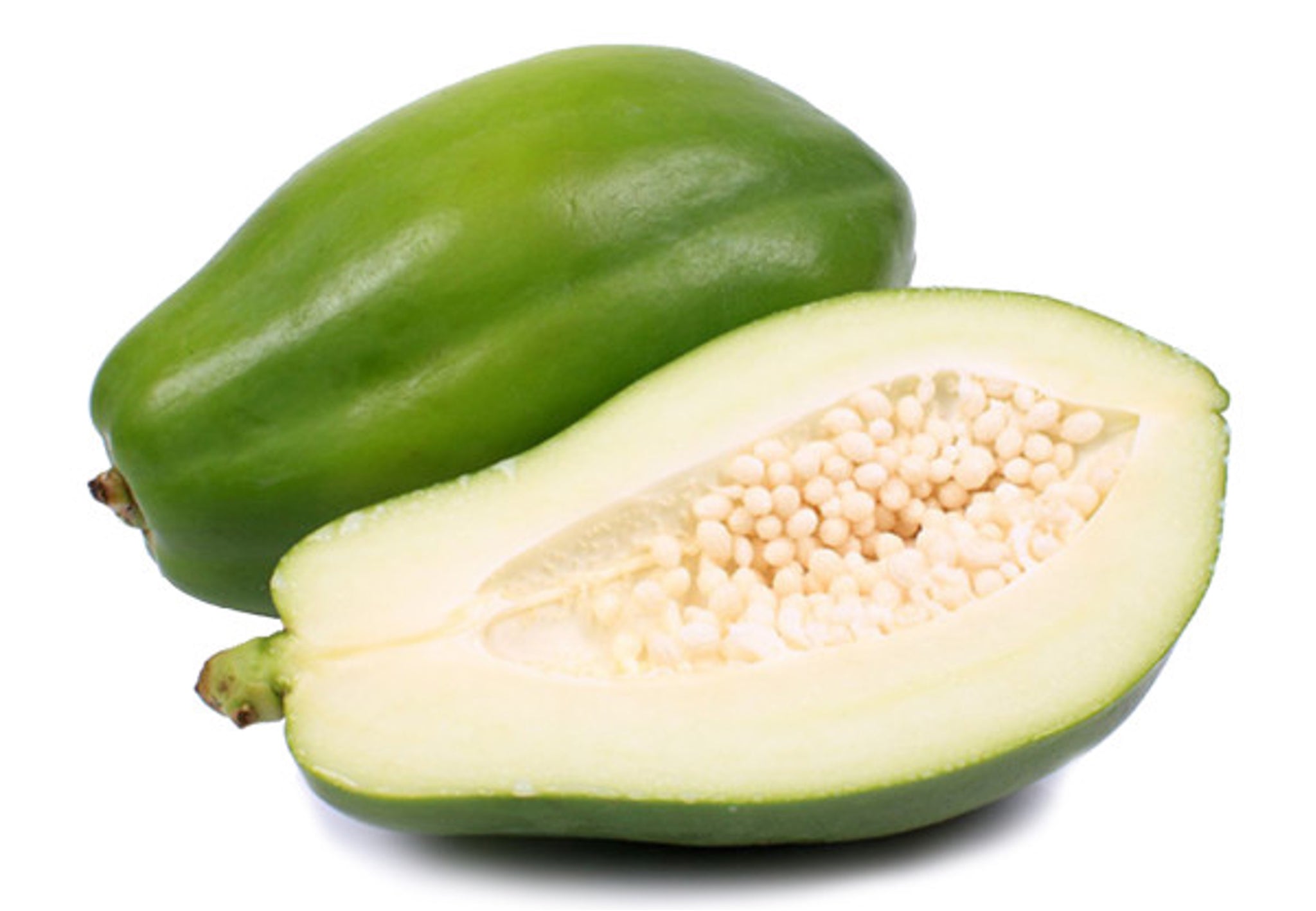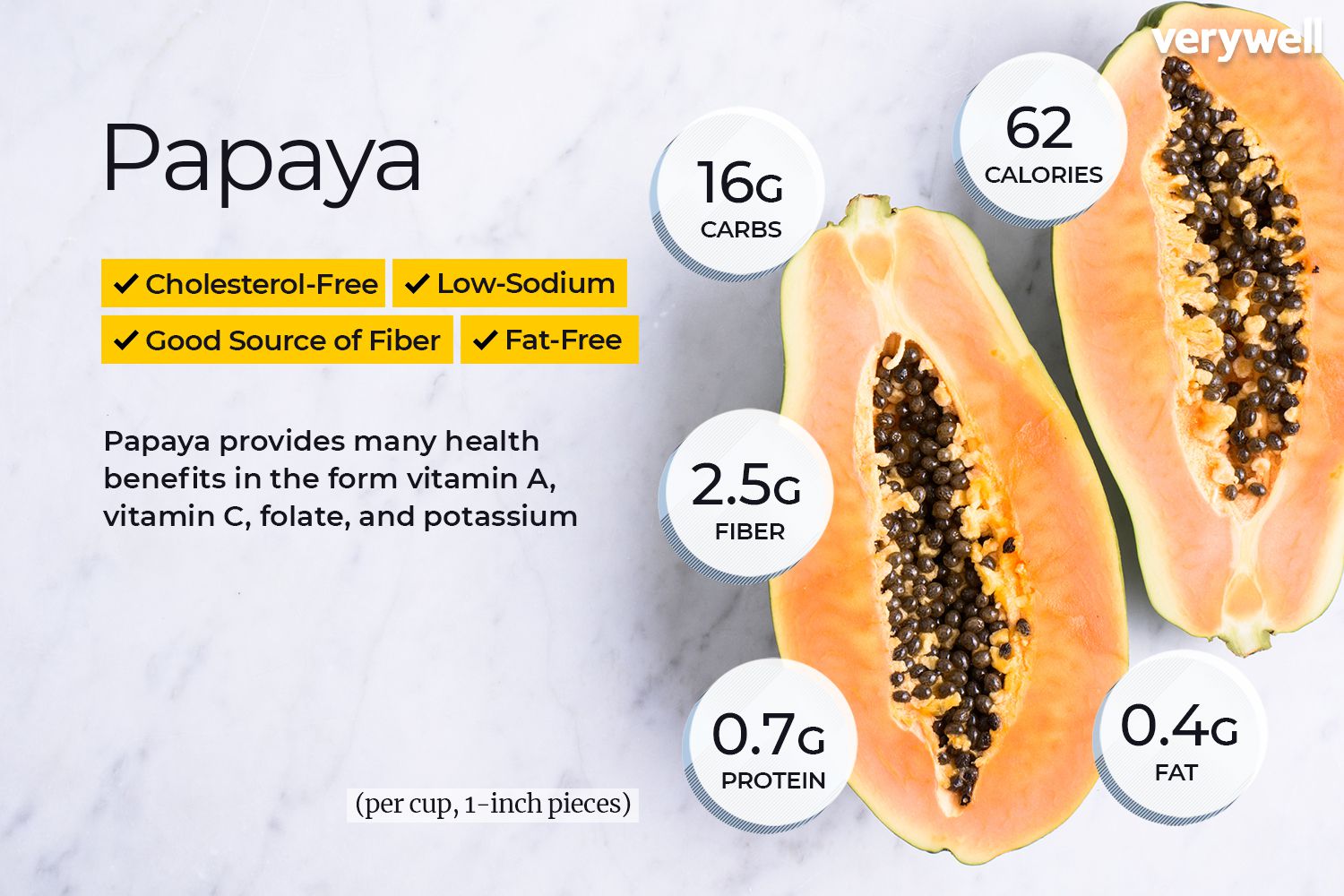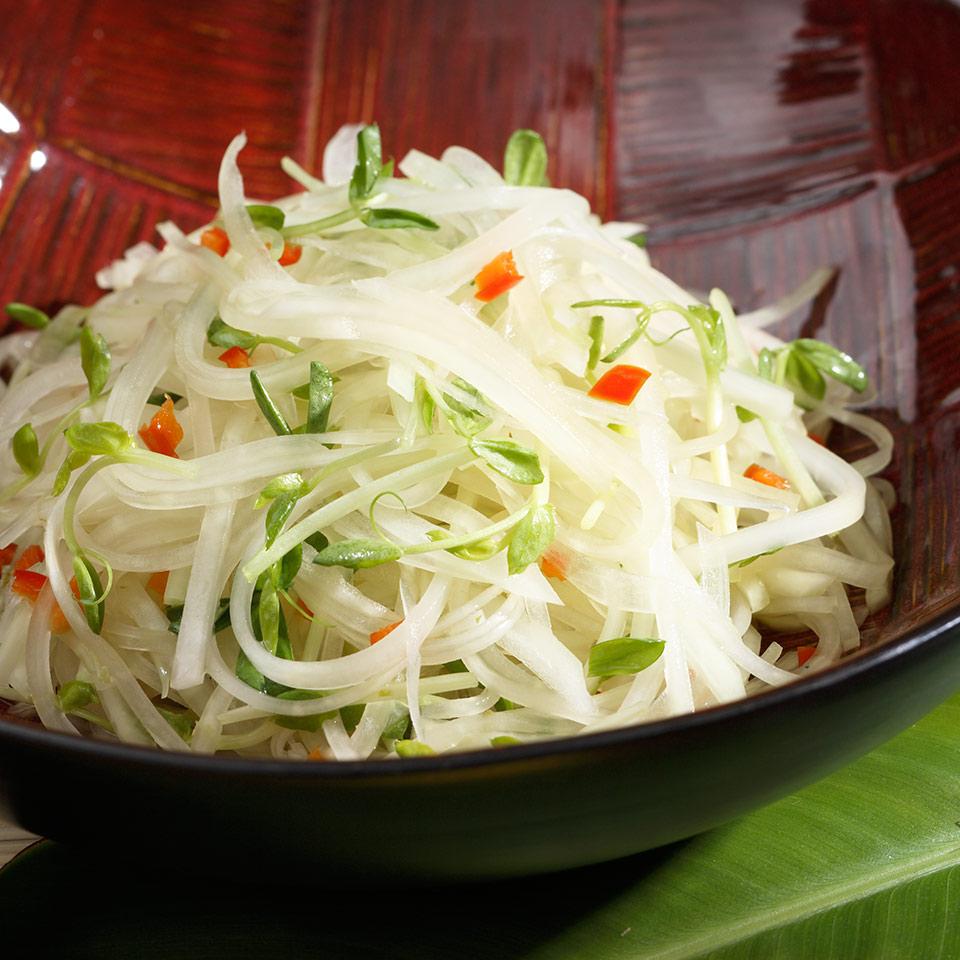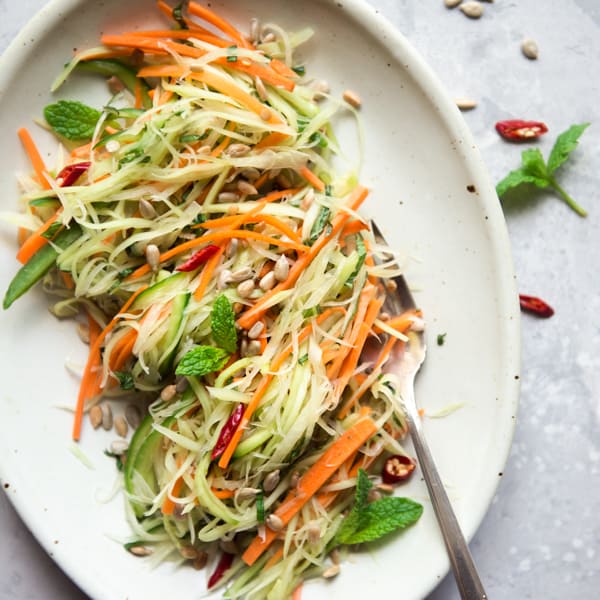Papaya
- Product Weight: 454 g
- Category: Fresh Fruits & Vegetables, Grocery & Gourmet Foods, Out of Stock, Vegetables
Papayas are a mildly sweet, soft, greenish/yellow fruit shaped like a large pear, weighing in at about 1 to 2 pounds. Due to their sweetness, you may be confused as to whether or not papayas are a healthy choice. Luckily, papayas are high in fiber and loaded with key nutrients like vitamin C and A.
Papayas add versatility to recipes and can be puréed for sweet and savory sauces, soups, or sorbets. Papayas also make for a good marinade, as they have an enzyme called papain which helps tenderize meat by breaking down proteins.
Papaya Nutrition Facts
The following nutrition information is provided by the USDA for 1 cup (145g) of raw papaya sliced into one-inch cubes.
- Calories: 62
- Fat: 0.4g
- Sodium: 11.6mg
- Carbohydrates: 16g
- Fiber: 2.5g
- Sugars: 11g
- Protein: 0.7g
Carbs
Papaya is a delicious fruit containing just 62 calories per cup. Most of the calories in papaya come from carbohydrates. There are almost 16 grams of carbohydrate in a serving of papaya including fiber (2.5 grams) and naturally-occurring sugars (about 11 grams). The glycemic index of papaya is 60 and the glycemic load is 9.2
Fats
There is almost no fat in papaya, with each 1-cup serving containing less than 1 gram.
Protein
Papayas provide less than 1 gram of protein per serving.
Vitamins and Minerals
Papaya is rich in vitamin C, providing 88.3 milligrams per serving. For most adults, the recommended dietary allowance of vitamin C is between 75–90 milligrams, so 1 cup of papaya just about covers 100% of vitamin C requirements.3 Papayas are also an excellent source of vitamin A and more specifically, the carotenoid lycopene.
Health Benefits
Due to their high nutrient content, papayas offer health benefits for the whole body. Keep your cells healthy and protected from damage with papaya's potent antioxidant vitamins.
Improves Skin
Vitamin C is a precursor that our bodies use to manufacture collagen. Because collagen is a critical component required for skin integrity, getting enough vitamin C improves your skin's ability to repair itself.3 To build strong connective tissues and heal properly from wounds, our bodies depend on vitamin C. Luckily, papaya is an easy way to reach your daily goals.
Protects Vision
Vitamin A is critical for good vision, and papayas are an excellent source. Beta carotene is the form of vitamin A that we consume in fruits, vegetables, and some protein foods. You may have heard that carrots are good for your eyes, but studies show the beta-carotene in papayas is three-times more bioavailable (i.e., easy to absorb) than the beta carotene in carrots or tomatoes.
For people with the beginning stages of age-related macular degeneration, adequate beta carotene intake has been associated with reducing the risk and severity of disease progression.4 Because vitamin A supplements have the potential to cause toxicity (since vitamin A is stored in the body and can build up to unsafe levels), food sources, like papaya, are a safe, healthy way to get this beneficial micronutrient.
Aids Digestion
Like most fruits and vegetables, papayas are rich in fiber which is essential for good digestion. Beyond this fundamental benefit, papayas also contain the enzyme papain. Papain helps break down proteins. If you have difficulty chewing or digesting meat, tenderizing it with papain before cooking makes it easier to eat.
Papain has also been studied for its ability to assist with gluten digestion in people with non-celiac gluten sensitivity. When provided an enzyme mixture derived from papayas and microorganisms, symptoms of gluten intolerance were shown to improve with no negative side effects of note.
Supports Heart Health
The fiber in papayas helps support heart health.7 Fiber also increases satiety, which can help with healthy weight management. Eating enough fiber (especially through fruits and vegetables) decreases the risk of heart disease. Papayas also provide potassium, magnesium, and pantothenic acid. All of which contribute to cardiovascular health.
Helps Prevent Cancer
The consumption of plant-based foods that are high in fiber is a well-established dietary pattern associated with cancer prevention. Furthermore, the combination of vitamins A, C, and E in papayas provide powerful antioxidant effects that may reduce free radicals and reduce overall cancer risk.
Papayas are a mildly sweet, soft, greenish/yellow fruit shaped like a large pear, weighing in at about 1 to 2 pounds. Due to their sweetness, you may be confused as to whether or not papayas are a healthy choice. Luckily, papayas are high in fiber and loaded with key nutrients like vitamin C and A.
Papayas add versatility to recipes and can be puréed for sweet and savory sauces, soups, or sorbets. Papayas also make for a good marinade, as they have an enzyme called papain which helps tenderize meat by breaking down proteins.
Papaya Nutrition Facts
The following nutrition information is provided by the USDA for 1 cup (145g) of raw papaya sliced into one-inch cubes.
- Calories: 62
- Fat: 0.4g
- Sodium: 11.6mg
- Carbohydrates: 16g
- Fiber: 2.5g
- Sugars: 11g
- Protein: 0.7g
Carbs
Papaya is a delicious fruit containing just 62 calories per cup. Most of the calories in papaya come from carbohydrates. There are almost 16 grams of carbohydrate in a serving of papaya including fiber (2.5 grams) and naturally-occurring sugars (about 11 grams). The glycemic index of papaya is 60 and the glycemic load is 9.2
Fats
There is almost no fat in papaya, with each 1-cup serving containing less than 1 gram.
Protein
Papayas provide less than 1 gram of protein per serving.
Vitamins and Minerals
Papaya is rich in vitamin C, providing 88.3 milligrams per serving. For most adults, the recommended dietary allowance of vitamin C is between 75–90 milligrams, so 1 cup of papaya just about covers 100% of vitamin C requirements.3 Papayas are also an excellent source of vitamin A and more specifically, the carotenoid lycopene.
Health Benefits
Due to their high nutrient content, papayas offer health benefits for the whole body. Keep your cells healthy and protected from damage with papaya's potent antioxidant vitamins.
Improves Skin
Vitamin C is a precursor that our bodies use to manufacture collagen. Because collagen is a critical component required for skin integrity, getting enough vitamin C improves your skin's ability to repair itself.3 To build strong connective tissues and heal properly from wounds, our bodies depend on vitamin C. Luckily, papaya is an easy way to reach your daily goals.
Protects Vision
Vitamin A is critical for good vision, and papayas are an excellent source. Beta carotene is the form of vitamin A that we consume in fruits, vegetables, and some protein foods. You may have heard that carrots are good for your eyes, but studies show the beta-carotene in papayas is three-times more bioavailable (i.e., easy to absorb) than the beta carotene in carrots or tomatoes.
For people with the beginning stages of age-related macular degeneration, adequate beta carotene intake has been associated with reducing the risk and severity of disease progression.4 Because vitamin A supplements have the potential to cause toxicity (since vitamin A is stored in the body and can build up to unsafe levels), food sources, like papaya, are a safe, healthy way to get this beneficial micronutrient.
Aids Digestion
Like most fruits and vegetables, papayas are rich in fiber which is essential for good digestion. Beyond this fundamental benefit, papayas also contain the enzyme papain. Papain helps break down proteins. If you have difficulty chewing or digesting meat, tenderizing it with papain before cooking makes it easier to eat.
Papain has also been studied for its ability to assist with gluten digestion in people with non-celiac gluten sensitivity. When provided an enzyme mixture derived from papayas and microorganisms, symptoms of gluten intolerance were shown to improve with no negative side effects of note.
Supports Heart Health
The fiber in papayas helps support heart health.7 Fiber also increases satiety, which can help with healthy weight management. Eating enough fiber (especially through fruits and vegetables) decreases the risk of heart disease. Papayas also provide potassium, magnesium, and pantothenic acid. All of which contribute to cardiovascular health.
Helps Prevent Cancer
The consumption of plant-based foods that are high in fiber is a well-established dietary pattern associated with cancer prevention. Furthermore, the combination of vitamins A, C, and E in papayas provide powerful antioxidant effects that may reduce free radicals and reduce overall cancer risk.




































